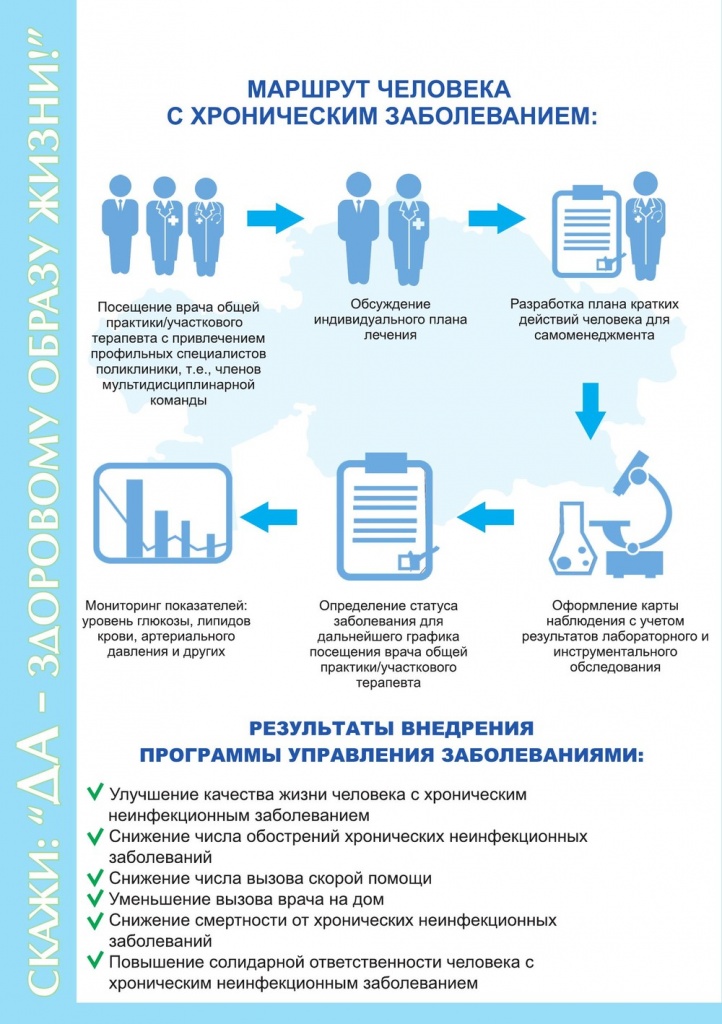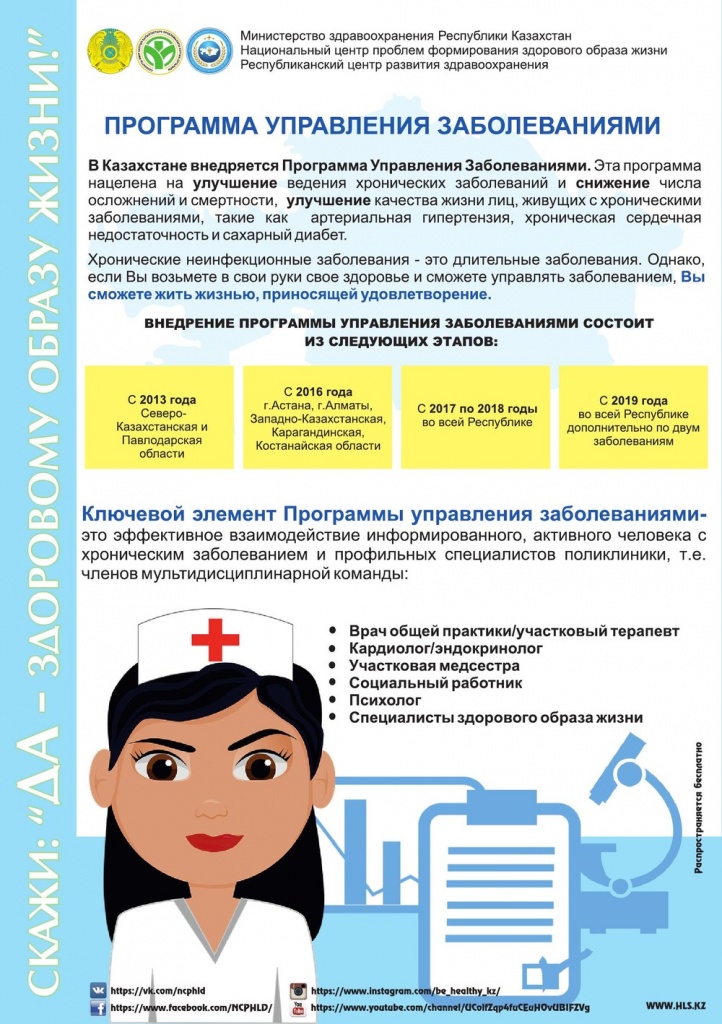Программа управления заболеваниями
Программа управления заболеваниями (ПУЗ)
|
|
«Мы должны серьёзно взяться за профилактику и повысить качество первичной медико-санитарной помощи. При грамотно организованной профилактической работе болезни можно предотвращать на ранней стадии. Поэтому в Казахстане необходимо внедрить комплекс национальных программ наблюдения за состоянием здоровья целевых групп населения». (Послание Президента Республики Казахстан – Лидера Нации Н.А. Назарбаева народу Казахстан «Стратегия «Казахстан 2050» - новый политический курс состоявшегося государства») |
В целях формирования солидарной ответственности за здоровье с вовлечением самого человека и управления хроническими неинфекционными заболеваниями, направленными на снижение заболеваемости, осложнений и смертности населения в рамках Государственной программы развития здравоохранения «Денсаулық» на 2016-2019 гг. МЗ РК проводится работа по усилению ПМСП с внедрением программ управления заболеваниями (ПУЗ), основанных на доказательной медицине.
Внедрение ПУЗ продиктовано необходимостью серьезных преобразований в вопросах профилактики и борьбы с хроническими неинфекционными заболеваниями, в повышении солидарной ответственности пациентов за свое здоровье, улучшения взаимодействия медицинского персонала и использования всех имеющихся ресурсов, направленных на предотвращение возможных осложнений или утяжеления состояний.
ПУЗ – это Программа, направленная на снижение затрат здравоохранения и улучшения качества жизни лиц с хроническими заболеваниями путем предотвращения или минимизации последствий заболевания с помощью интегрированной помощи.
Вместе с тем, ПУЗ – это система скоординированных медицинских вмешательств и коммуникаций для определенных групп пациентов с состояниями, где можно прилагать усилия по самопомощи/самоменеджменту. Такая программа дает возможность отдельным лицам вместе с другими поставщиками медицинских услуг управлять своим заболеванием и предотвращать осложнения.
Международный опыт и различные подходы во внедрении ПУЗ были обсуждены на уровне МЗ РК с международными консультантами. Было решено разработать и внедрить программу управления заболеваниями, основанную на научно-доказательной медицине, повысить осведомленность населения по вопросам здоровья и солидарную ответственность за здоровье граждан между государством, работниками и самими гражданами для решения подходов социальной модернизации и дальнейшего укрепления реформ здравоохранения.
В деятельность медицинских организаций Карагандинской области внедряется работа 5 программ управления хроническими неинфекционными заболеваниями:
1. Сахарный диабет (СД)
2. Артериальная гипертензия (АГ)
3. Хроническая сердечная недостаточность (ХСН)
Согласно рекомендациям экспертов Всемирной организации здравоохранения, службам здравоохранения необходимо стать более ориентированными на человека, чтобы способствовать улучшению здоровья людей в эпоху широкой распространенности хронических заболеваний.
Управление заболеваниями (самоменеджмент) – это способность человека с хроническими заболеваниями управлять симптомами, лечением физическими и социальными последствиями, а также изменениями в образе жизни для снижения числа обострений, осложнений, потребности в стационарной и скорой медицинской помощи.
В ПУЗ принимает участие команда медицинских работников или так называемая мультидисциплинарная команда – врачи, медсестры, специалисты здорового образа жизни, психологи, социальные работники и другие, и конечно же человек с хроническим заболеванием, а также круг поддержки определяемый самим человеком , ими могут быть члены семьи, друзья, коллеги, соседи, пациенты с такими же заболеваниями и другие).


КАРТА НАБЛЮДЕНИЯ ЗА ПАЦИЕНТОМ (КНП) ПРИ ХСН
Образец клинического протокола: Хроническая сердечная недостаточность (ХСН)
Отчет исходных данных по индикаторам Хронической Сердечной Недостаточности (ХСН)
Поддержка самоменеджмента Руководство для тренеров
КАРТА НАБЛЮДЕНИЯ ЗА ПАЦИЕНТОМ (КНП) С САХАРНЫМ ДИАБЕТОМ
Образец клинического протокола: Сахарный диабет 2-го типа
Отчет исходных данных по индикаторам для Сахарного Диабета, 2 тип
Соглашение об участии в Программе управления хроническими неинфекционными заболеваниями
Шаблон краткого плана действий
КАРТА НАБЛЮДЕНИЯ ПАЦИЕНТА (КНП) ПРИ АРТЕРИАЛЬНОЙ ГИПЕРТОНИИ
Отчет Исходных Данных по Индикаторам Первичной Артериальной Гипертензии
